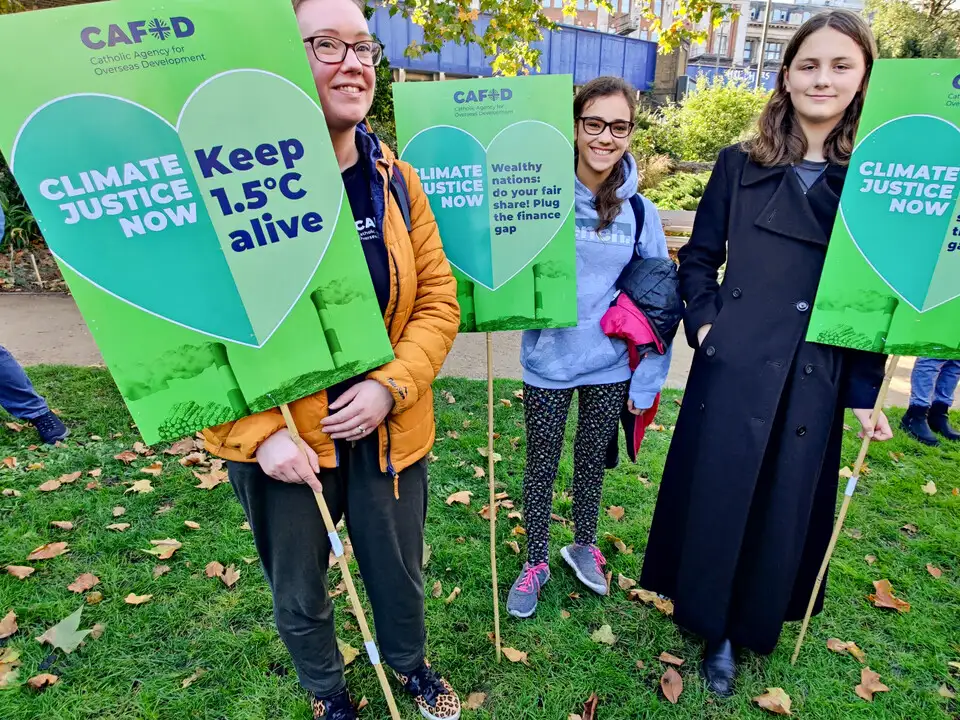Our campaign urging world leaders to support refugees and migrants has come to an end after tens of thousands of people responded to Pope Francis’s message on migration and world leaders adopted the UN Global Compacts.
More than 40,000 CAFOD supporters walked in solidarity with people on the move such as refugees, asylum seekers and migrants, walking more than four times around the world in the process.
And we took your message to Prime Minister Theresa May in Downing Street, calling on the government to play a leading role in the two agreements which became the UN refugee and migration pacts.
'A resounding message to governments' on migration
Daniel Hale, CAFOD’s Head of Campaigns, said:
“A huge thank you to everyone who supported the Share the Journey campaign. Together, we called for leaders to assist people on the move. And it wasn’t just England and Wales, we joined CAFOD’s Caritas sister agencies from across the world.
“More people than ever before have been displaced from their homes and the vast majority of those are living in countries which are themselves already poor.
“We’ve sent a resounding message to governments that we expect them to protect the dignity and rights of everyone, especially the most vulnerable people who face the greatest hardships when they leave their homes.”
Launch of campaign with Pope Francis statement on refugees and migrants
The Share the Journey campaign was launched in September 2017 following Pope Francis’s message for the World Day of Migrants and Refugees.
In the letter, the Pope explained how the struggles faced by people forced from their homes by poverty or persecution has been a key theme of his papacy.
The Holy Father described how the Catholic Church wished to offer guidance to political leaders based on its experience supporting refugees, asylum seekers and immigrants worldwide ahead of negotiations for the UN migration and refugee pacts.
How Catholics supported refugees and migrants
Over 40,000 Catholics responded to the Pope’s call by organising and taking part in walks in parishes and schools to show solidarity with displaced people.
We walked more than 110,638 miles in total – a distance equivalent to four times the circumference of the world!
Miriam McEneaney, who took part in a walk at St Mary Moorfields Church in central London, said:
“Everyone was very mindful of what we were walking for. There were all ages and different nationalities among us. We could have represented any refugee group.
“We have an opportunity here to change the lives of refugees today and those forced to flee in the future. If the people in power see enough of us walking, they cannot ignore us.”
In August 2018, we displayed hundreds of shoes outside Westminster Cathedral to symbolise the walks and the journeys undertaken by migrants and refugees. The display contained shoes from refugees supported by CAFOD and by people who had taken part in walks in England and Wales.
The UN Global Compacts on Migrants and Refugees
Pope Francis called on politicians “to take decisive action in support of migrants and refugees to save their lives and protect their rights”.
The voices of Catholics in England and Wales, along with thousands of others taking part in the Caritas Share the Journey campaign elsewhere in the world, helped to show governments the scale of support for measures to assist people on the move.
World leaders committed to this by adopting two UN agreements at conferences in New York and Marrakech: the Global Compact on Refugees and the Global Compact for Safe, Orderly and Regular Migration.
The Compacts are unique because they cover a range of migration issues rather than addressing each individually in different treaties. The pacts cover things such as how to save lives, combat trafficking and improve border management - setting out a series of goals to guide how resources might be used in the future.
Importantly, the Global Compacts recognised that despite there being a different legal status and definition for migrants and refugees, common challenges exist. They also noted some of the reasons why people migrate in search for a better life elsewhere – including poverty and climate change.
What is happening following the Global Compacts?
Graham Gordon, CAFOD’s Head of Policy, said that the Global Compacts were “a testament to the leadership shown by the Pope and the Church during negotiations.”
Graham said:
“Now we need to ensure that the governments put their words into action and implement their provisions.
"We are working with our partners around the world to ensure that this happens.”

Speak up for justice
Find out how you can campaign with CAFOD on issues such as the global food system, the climate emergency, cancelling debt and human rights.

